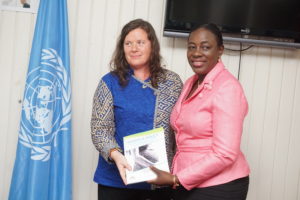…over 6000 pregnancies recorded in 2 years
After over one year of research and consultations, the National Policy for the Reintegration of Adolescent Mothers into the Formal Education System was on Monday released to the Education Ministry.

Education Minister Nicolette Henry
With this initiative – that will be implemented soon – many adolescent mothers will be given an opportunity to complete their formal secondary education and the system will also be used as a preventative measure whereby stakeholders will be sensitized to ensure that the policy is effective.
Present at the launch of the policy framework document was the United Nations Children’s Fund (UNICEF) representative, Sylvie Fouet, who highlighted that Guyana is second on the list for the highest number of teenage mothers in the Caribbean and Latin America, with about 97 births for every 1000 teenage girls. It is also in close range with The Dominican Republic which tops the list.
Some alarming statistics according to her reveal that, “Teen pregnancy is about 20 to 22 per cent or about one out of five teenage girls below the age of 19.”
Among the 15 factors that lead to teenage pregnancies as highlighted in the study, it was revealed that some of them include school dropouts, lack of knowledge and difficult relationships with parents and family members, poverty, incest, exploitation and sexual abuse.
During interactions with teen mothers, most of them had thoughts of illegal abortion and abandoning their new-born child.
Meanwhile, Chief Education Officer Marcel Hutson highlighted that unsuccessful attempts by the Education Ministry to bring awareness in the past could be blamed on the lack of a framework document to use as a guide when dealing with such situations.
“A factor that must not be discounted is that many adolescent pregnancies maybe a consequence of forced sex, rather than consensual or risky sexual behaviour and therefore we have a responsibility to protect those girls.”
Brief remarks were also given by Education Minister Nicolette Henry who noted that this is a way of modernising education in Guyana.
“Teenage pregnancy is a complex issue which has multiple contributing factors that are common knowledge to many. It is a symptom of a bigger societal sickness. It is now just a health issue, but a development issue that is deep-rooted in poverty, gender inequality, violence, child forced marriages, and power imbalances between teenage girls and their partners,” she said.
In 2015, some 3712 girls were reported pregnant while in 2016, a total of 3032 were recorded. In both cases, the age range was between 15 to19 years.



